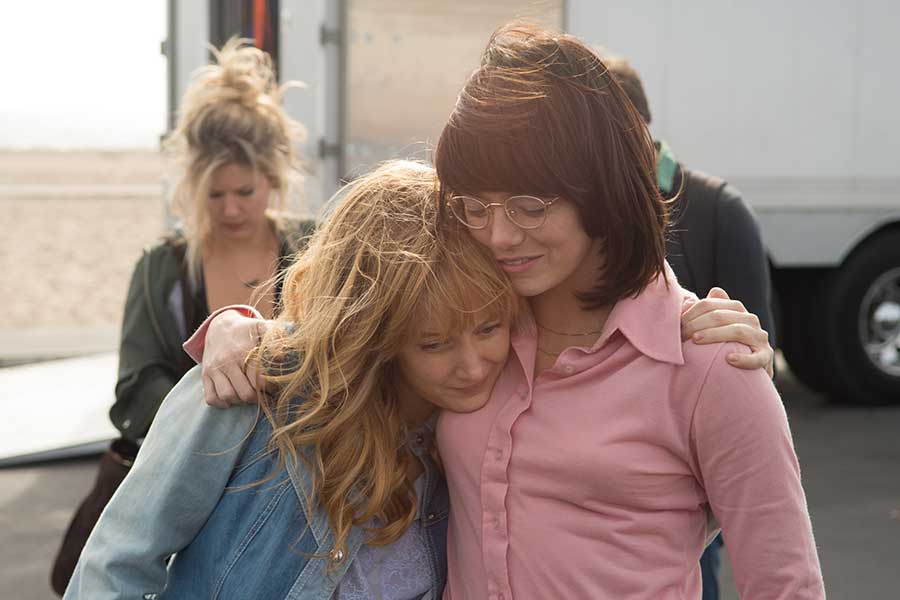The highly entertaining comedy-drama “Battle of the Sexes,” opening Sept. 29 at area theaters, depicts Billie Jean King’s public struggle for equality on the tennis courts and her private struggle with her sexuality.
The film, directed by Valerie Faris and Jonathan Dayton (of “Little Miss Sunshine” fame), chronicles the discrimination King (Emma Stone) faced in 1973, when she was the most successful female tennis player of all time. Earning a $100,000 prize, King gets a call from President Nixon, but no respect from U.S. Lawn Tennis Association director Jack Kramer (Bill Pullman), who thinks that people pay to see the men play because they are more exciting to watch. When Kramer offers King an eighth of the men’s prize money, she — along with her tart-tongued promoter, Gladys Heldman (Sarah Silverman) — start their own women’s league to prove Kramer wrong.
The film focuses on King’s fight for gender equality in an era when the women’s movement was making huge strides. King insists that while she may identify as a feminist, she is “a tennis player who happens to be a woman.” Watching her dress down Kramer, rude male journalists and tennis legend and self-proclaimed male chauvinist pig Bobby Riggs (Steve Carell) provides much of the film’s feistiness and humor.
However, in King’s magnanimous efforts to promote women, she also finds herself becoming attracted to them. When she meets stylist Marilyn Barnett (Andrea Riseborough), a routine haircut becomes something of an erotic awakening for King. She soon starts to respond to her same-sex feelings, spending a night with Marilyn that may be blissful, but with the caveat that it can’t last. King explains to her lover that she has too much at stake with her career to act further on her desires. Although she and Marilyn continue to spend evenings together on the road, the relationship starts to affect more than just her game. Not only does King lose a match against a female rival, but she also jeopardizes her marriage to Larry (Austin Stowell).
It is at this juncture that the 29-year-old King, boxed into a corner for various reasons, accepts the ridiculous offer to play against the 55-year-old, three-time Wimbledon champ Riggs, who wants to prove that King can’t beat a man. The “battle of the sexes” quickly becomes a huge publicity stunt generated by Riggs to inflate his sense of superiority. For King, the game is an opportunity to prove herself and improve gender equality.
“Battle of the Sexes” spends most of its first half setting up the match between King and Riggs, but the climatic game is exciting even if the outcome is known. Watching Riggs mouth off about a woman’s place “being in the kitchen or bedroom,” or dressing in ridiculous costumes (and even undressing for “Cosmopolitan” magazine), is as amusing as it is disrespectful. But this braggadocio only makes Riggs’ come-uppance that much more satisfying. Such broad comedy underscores the very real, very emotional journey that King is going through while this spectacle is unfolding.
King may be distracted by her personal life, but she is counseled by Ted (Alan Cumming), a gay designer on the women’s circuit who serves as King’s wise old uncle. He tells her to be careful about her sexuality, even giving her a heads-up one night when Larry arrives unexpectedly at the hotel where King and Marilyn are sharing a bed. How the film addresses queer identity politics is interesting, as the era was not very forgiving and sponsorships were critical for players’ financial success. That athletes could not be openly gay and women lacked equal pay are topics that, unfortunately, are still timely.
But “Battle of the Sexes” never overemphasizes these points, even if the film’s music tells viewers what to feel during the tennis matches or some of the dramatic moments. Such emotional manipulation isn’t necessary in a film that is both rousing in its “Go, girl!” moments and considerably touching in scenes as when King asks Marilyn, “How are you so free to be yourself?”
Curiously, the filmmakers handle King’s story so well, they falter somewhat in depicting Riggs’ storyline about his gambling addiction, his rocky relationship with his wife, Priscilla (Elizabeth Shue), and his penchant for over-the-top showmanship. Carell gives a fine, deliberately grating performance, but Riggs never comes off as a real character; he’s more of a caricature. The filmmakers try to engender pathos showing how bored and depressed Riggs is, but he is just too unsympathetic.
As King, Stone delivers a very convincing performance, getting the tennis legend’s gait and body language right while also making her internal, emotional struggle palpable. She also has a fine rapport with Riseborough.
“Battle of the Sexes” adroitly captures the era and an event that still has importance for women and the LGBT community.
